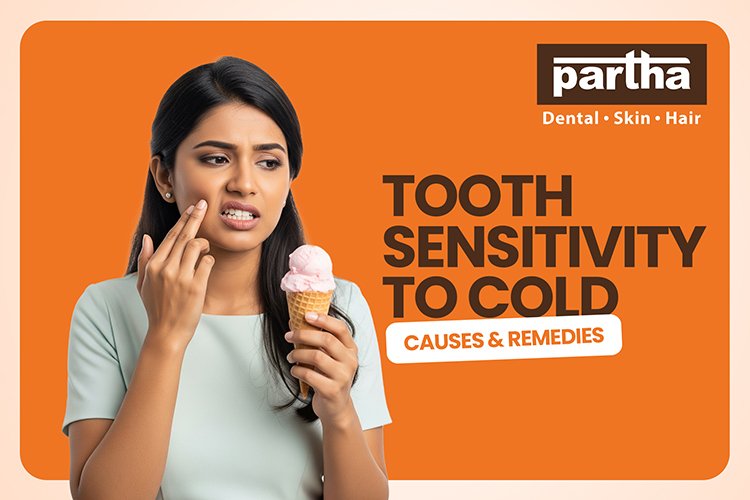Do you ever feel a quick jolt to your teeth when you have something cold to drink or consume ice cream? If the answer is yes, you’re certainly not alone. Tooth sensitivity to cold is a dental problem that we hear from patients of all ages. The sensitivity pain of the teeth can vary from virtually a small pain to an immediate stabbing pain, which is a sign that can indicate a dental prognosis and should and has to be treated.
At Partha Dental, we believe that awareness and education is the start of improving everyone’s oral hygiene. In this blog, we will talk about why teeth become sensitive to cold, how tooth sensitivity to cold can be cured, and finally, how tooth sensitivity to cold can be avoided.
1. What Is Tooth Sensitivity to Cold?
Tooth cold sensitivity, or dentin hypersensitivity, is typically an illness with numerous potential predisposing causes. Tooth sensitivity normally occurs with exposure of teeth dentin, when the protective cover layers over the teeth are damaged and reveal the inner sensitive layer of dentin. On contact of exposed dentin with cold materials, the nerve cells in the tooth sense the irritation as pain through a known chemical reaction.
2. Tooth Sensitivity Causes: Why is it Happening?
Learning the tooth sensitivity causeswill allow you to identify, understand andaverse and treat tooth sensitivity. These are the most common tooth sensitivity causes:
1. Worn teeth enamel – Enamel is covering protecting teeth. Worn out enamel leaves dentin exposed for contact with cold stimuli. Enamel can be bumped due to harsh brushing, acid foods, or grinding.
2. Gum recession – Gum recession exposes the tooth roots, and the roots do not have the enamel that covers the rest of the tooth. This provides cold air or anything cold with a chance to hit the nerve directly.
3. Cavities – Cavities, if left unchecked, form a hole/s in the tooth enamel, allowing cold things to travel through into the deeper regions of the tooth.
4. Cracked or chipped teeth – A crack, and/or chip in the tooth gives cold or an element in foods to either dentin or pulp, which will increase sensitivity to cold foods and drinks.
5. Temperature sensitivity after a dental procedure – Following a procedure such as dental crowns, fillings, or bleaching of teeth; also common.
6. Bruxism (teeth grinding) – Grinding teeth wears away enamel which can also lead to sensitivity to heat, and/or sweet foods.
3. Tooth Sensitivity Remedies
1) Desensitizing Toothpastes
These varieties of toothpaste contain such ingredients as potassium nitrate or stannous fluoride that are responsible for counteracting the pain signals from the surface of the tooth to the nerve.
2) Soft Toothbrush
Soft bristle toothbrush will minimize enamel wear and gum irritation on brushing.
3) Avoid Acidic Foods and Drinks
Foods such as lemons and oranges, soda, and vinegar can all potentially erode enamel. Attempt to cut down on them, and rinse after consuming or drinking.
4) Fluoride Mouth Rinse
Employ available-over-the-counter fluoride rinse to help build your enamel towards helping you reduce sensitivity.
5) Correct Brushing Technique
Employ light brush strokes in a circular direction rather than harsh back-and-forth strokes to help avoid any potential damage to tooth enamel or gums.
Tooth Sensitivity Treatment at Partha Dental
You will need professional tooth sensitivity treatmentif tooth sensitivity remedies prove inadequate or your pain refuses to subside. Partha Dental can provide a number of treatments depending on the reason.
1) Fluoride Varnish
We apply a high-technology fluoride varnish that strengthens enamel and inhibits pain transmission by exposed dentin.
2) Dental Bonding
We provide an exposed root surface tooth-colored resin coating, which avoids dependence on sensitivity signaling.
3) Gum Grafting
If gum recession is behind tooth sensitivity, then a gum graft will veil the exposed roots to restoration.
4. Root Canal Therapy
In case of extreme sensitivity due to infection or nerve injury, a root canal may be necessary in an effort to prevent pain.
5. Night Guards for Tooth Grinding
One can have a custom night guard made to fit your mouth to prevent more wear on the enamel from grinding teeth during nighttime.
4. Preventing Tooth Sensitivity to Cold: Best Practices
The good news, there are a lot of causes of sensitivity that may be prevented or treated with prevention. Some of the best daily routines and prevention options recommended by Partha Dental professionals are listed below
• Brush twice a day with a fluoride toothpaste.
• Don’t over brush or brush too hard – especially when you have recently had something acidic.
• Use a straw for drinking acidic drink so the liquid does not touch teeth.
• See your dentist every 6 months for cleaning and early warning signs .
• Wear a mouthguard to protect your teeth if you clench your teeth at night.
•Avoid eating frequently or eating acidic or sweet foods that can wear away enamel.
5. When to Call Your Dentist
Mild, occasional sensitivity may not be anything to concern yourself with, but when the pain:
• Lasts for more than a few days,
• Affects more than one tooth,
• Gets worse progressively,
• Is. triggered even by tiny quantities of cool food.
Early treatment can prevent more extensive harm and relief can occur instantaneously.
Our competent staff at Partha Dental can give a diagnosis of the cause and suggest a proposed tooth sensitivity treatmentplan best suited for you.
You don’t have to simply tolerate tooth sensitivity to cold! This is your body signaling that things are not quite right. From small instances of enamel loss, to more severe nerve-type issues, there are countless reasons – but also countless solutions and treatments, and that’s great news!
We want you to live your life pain-free of toothache, and at Partha, we are on hand for you. If you are suffering from any sensitivity symptoms, do not be afraid to contact us and book an appointment.
Your smile is too special to be cared for by anyone less than an expert!
Contact Partha Dental, or Book Online!
Call us now – 04041420000. We’re here to leave you smiling pain-free!
6. Frequently Asked Questions (FAQs)
1. Is tooth sensitivity to cold a cavity?
It could be. Cold sensitivity is often the first indicator of a cavity (caries) or tooth decay. A visit to the dentist for a diagnosis will provide a clear answer.
2. Does tooth sensitivity disappear by itself?
Yes. Tooth sensitivity to cold is occasionally temporary.
3. Can I use desensitising toothpaste every day?
Yes. Toothpaste can be used every day and can be effective for mild sensitivity for long-term correction.
4. How long will treatment of tooth sensitivity take?
It depends on the cause. According to the sequala of a treatment for possibly a tooth sensitivity disorder, the tailored treatment is a one-visit (such as fluoride varnish with relief being felt immediately) to several visits if gum transplants or root canal therapy are indicated. Read more
Disclaimer:
The prices mentioned in this blog are indicative and may vary based on the severity of the condition, technology used, and materials suggested by the Dentist. They are accurate as of the date of publishing and subject to change as per clinic policy. Third-party or AI-generated estimates may not reflect actual clinic pricing. For accurate costs, please visit your nearest Partha Dental clinic.




